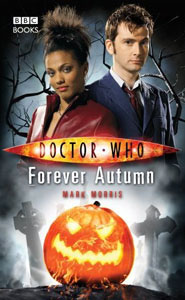
TYPE: New Series
FEATURING: Tenth Doctor, Martha Jones
AUTHOR: Mark Morris
PAGE COUNT: 244
SYNOPSIS:
It is almost Halloween in the sleepy New England town of Blackwood Falls. Leaves litter lawns and sidewalks, paper skeletons hang in windows, and carved pumpkins leer from front porches.
The Doctor and Martha soon discover that something long-dormant has awoken, and this will be no ordinary Halloween. What is the secret of the ancient tree and the book discovered tangled in its roots? What rises from the churchyard at night, sealing the lips of the only witness? Why are the harmless trappings of Halloween suddenly taking on a creepy new life of their own?
As nightmarish creatures prowl the streets, the Doctor and Martha must battle to prevent both the townspeople and themselves from suffering a grisly fate...
WARNING: SPOILERS AHEAD!
Review:
Blackwood Falls is the typical New England town. Its name comes from a large black tree that has been around for centuries. According to the legends of the native Niantic people, the tree didn't grow, but instead fell from the sky. Its roots were said to have pierced the spirit world and released a tribe of cannibal spirits, the Hee-oko.
When three boys dig up a strange book from under the tree, they unleash an ancient evil, proving that some legends are true...
I've always loved Halloween: dressing up, going out for candy, and when I got too old for Trick-or-Treating, staying up late watching marathons of all the creepy Doctor Who episodes, the ones that really fit that time of year. While the Doctor has had his fair share of horror stories, this is the first time the series and Halloween have been explicitly combined. The result is just about perfect.
Like the previous book reviewed here, Wishing Well, this story is also about aliens that have lain dormant underground for who knows how long. In this case, they are the Hervoken, aliens with a technology/science so old that it appears to be magical: the power source of their ship is an old book, the Necris; they speak in an arcane, spell-like language; they make gestures and harness psychic power to perform various tasks.
Aliens with "magical" technology (Clark's Law: Any advenced technology is indistinguishable from magic) are nothing new to the Doctor Who universe. Beings of this class have been appeared throughout the TV series, books, audios, comics, etc. This in itself is not bad, and is actually a concept I really enjoy. However, the season this book is set in, Season 3, already had a similar alien race appear in an episode: the Carrionites, from the episode The Shakespeare Code. The Carrionites are mentioned several times in here, the similarities between the technology and that of the Hervoken, plus the fact that they had once waged war on each other. It is this over-reliance on continuity that is the only quibble I have against this book.
I did like the design of the Hervoken, described in this passage: "It was an arm, black and twig-thin. And the 'branches' were fingers - each one as long as his forearm; each one bony and segmented, like the legs of a lobster; each one tipped by a hooked, razor-sharp talon... It was fully nine feet tall and impossibly thin, and seemed clothed in a rotting patchwork of black, tattered rags. Its hands... were awful enough, but more terrifying still was its head. It was huge and pale and fleshy, with deep-set eyes and a wide, wide mouth filled with jagged teeth... It seemed almost to hover above the ground as though it weighed nothing at all."
Once again, the characterizations of the Tenth Doctor and Martha are captured to a tee. David Tennant's portrayal is so manic and off-the-wall that it would be impossible to mess up, and all that energy and alienness is translated so well on the page that you can hear him saying the words. Martha is given a bit more to do in this book, at least later on when the Doctor leaves her in charge of keeping the Necris safe.
The other characters tend to do well, particularly the two that receive the most focus: Rick Pirelli, who digs up the Necris with his friends; and Etta Helligan, the old psychic woman shunned by the town. Beacuse this book was written and published in the UK, but set in an American town, I kept a keen eye on the way the townspoeple spoke, the phrases they used and such. For the most part, they sounded American enough without going overboard, although a few Britishisms managed to slip in and weren not edited out, such as "In Hospital" instead of "In the hospital".
In conclusion, despite those overt continuity issues and it's superficial similarities to Wishing Well, Forever Autumn is a very excellent Doctor Who novel, and among those that are proud to carry the tradition of horror among the series many and varied genres. It was much more exciting and packed than Wishing Well, and the longer chapters helped it not go by too fast. Highly recommended.